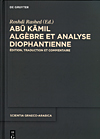- About MAA
- Membership
- MAA Publications
- Periodicals
- Blogs
- MAA Book Series
- MAA Press (an imprint of the AMS)
- MAA Notes
- MAA Reviews
- Mathematical Communication
- Information for Libraries
- Author Resources
- Advertise with MAA
- Meetings
- Competitions
- Programs
- Communities
- MAA Sections
- SIGMAA
- MAA Connect
- Students
- MAA Awards
- Awards Booklets
- Writing Awards
- Teaching Awards
- Service Awards
- Research Awards
- Lecture Awards
- Putnam Competition Individual and Team Winners
- D. E. Shaw Group AMC 8 Awards & Certificates
- Maryam Mirzakhani AMC 10 A Awards & Certificates
- Two Sigma AMC 10 B Awards & Certificates
- Jane Street AMC 12 A Awards & Certificates
- Akamai AMC 12 B Awards & Certificates
- High School Teachers
- News
You are here
Abū Kāmil: Algèbre et Analyse Diophantienne

Publisher:
Walter de Gruyter
Publication Date:
2015
Number of Pages:
819
Format:
Hardcover
Series:
Scientia Graeco-Arabica
Price:
224.00
ISBN:
9783110295665
Category:
Monograph
[Reviewed by , on ]
Fernando Q. Gouvêa
04/14/2017
Abū Kāmil, who lived in Egypt from around 850 to around 930, is remembered mostly for his Algebra. In this book Roshdi Rashed presents a new edition (apparently the first critical edition) of the complete Arabic text with a French translation on facing pages, together with an extensive commentary. This is the only complete translation into a language I can read, so I am very glad to have it.
Abū Kāmil’s Algebra starts out, as do most Arabic algebras, with a discussion of the six kinds of quadratic problems. Then follow a large number of problems that can be solved using these methods. Many of them involve dividing 10 into two summands or two factors that have to satisfy another constraint, and so have something of a “recreational” flavor.
The next two sections are quite interesting. Apparently inspired by Book X of Euclid’s elements, Abū Kāmil considers problems in which various kinds of irrational numbers appear. The numbers he deals with are all either quadratic irrationals or generalizations: things like \(\sqrt{a+\sqrt{b}}\) or \(\sqrt{a}+\sqrt{b}\). This may well be the earliest text in Arabic where such quantities are treated as numbers. He then, still following Euclid, applies this to the study of regular polygons (specifically the pentagon and decagon).
Abū Kāmil follows that with a section on indeterminate problems. Rashed claims that this is the first example of the explicit distinction between determinate problems, with a unique solution, and indeterminate problems, which have many solutions and typically are to be solved under restrictions; here the solutions are supposed to be positive rational numbers. (It seems clear that Abū Kāmil did not know Diophantus’s Arithmetica, though a translation into Arabic did exist in his time.)
Rashed also includes another short work, The Book of Birds, which is dedicated to problems of the “hundred fowls” type: someone buys a hundred birds of various kinds for a hundred units of money; given the price of each kind of bird, determine how many of each were bought. Abū Kāmil seems particularly interested in the fact that such problems can have a large (but finite) number of solutions.
The edition and translation of these texts is very well done, and everyone interested in this historical period or in the history of algebra will be grateful for having it. Things are less clear when it comes to Rashed’s commentary and interpretation of this material, which is very much open to debate. Those interested in a detailed discussion of the issues might start by looking at the review in Aestimatio, written by Jeff Oaks.
Fernando Q. Gouvêa is Carter Professor of Mathematics at Colby College in Waterville, ME. He loves reading old books.
- Frontmatter
- Préface
- Sommaire
- Avertissement
- INTRODUCTION
- 1. Abū Kāmil: algébriste et ingénieur
- 2. Les écrits mathématiques d’Abū Kāmil
- PREMIÈRE PARTIE
- CHAPITRE I: La théorie des équations et la démonstration des algorithmes
- CHAPITRE II: Le calcul algébrique et ses applications
- CHAPITRE III: L’application de l’algèbre à la géométrie plane: les pentagones et les décagones réguliers
- CHAPITRE IV: L’analyse indéterminée rationnelle
- CHAPITRE V: Problèmes arithmétiques
- CHAPITRE VI: Analyse indéterminée entière du premier degré
- CHAPITRE VII: La démonstration aux commencements de l’algèbre
- SECONDE PARTIE. TEXTES ET TRADUCTIONS
- Livre d’algèbre et d’al-muqābala
- Préambule
- Les six équations
- Le calcul algébrique et ses applications
- Le pentagone et le décagone régulier
- Analyse indéterminée rationnelle
- Problèmes numériques et progressions
- Livre sur les volatiles: Analyse indéterminée entière du premier degré
- Livre d’algèbre et d’al-muqābala
- APPENDICE : Extrait d’al-Bāhir en algèbre d’al-Samaw’al
- NOTES COMPLÉMENTAIRES
- GLOSSAIRE ARABE-FRANÇAIS
- INDEX
- OUVRAGES CITÉS
- Log in to post comments




